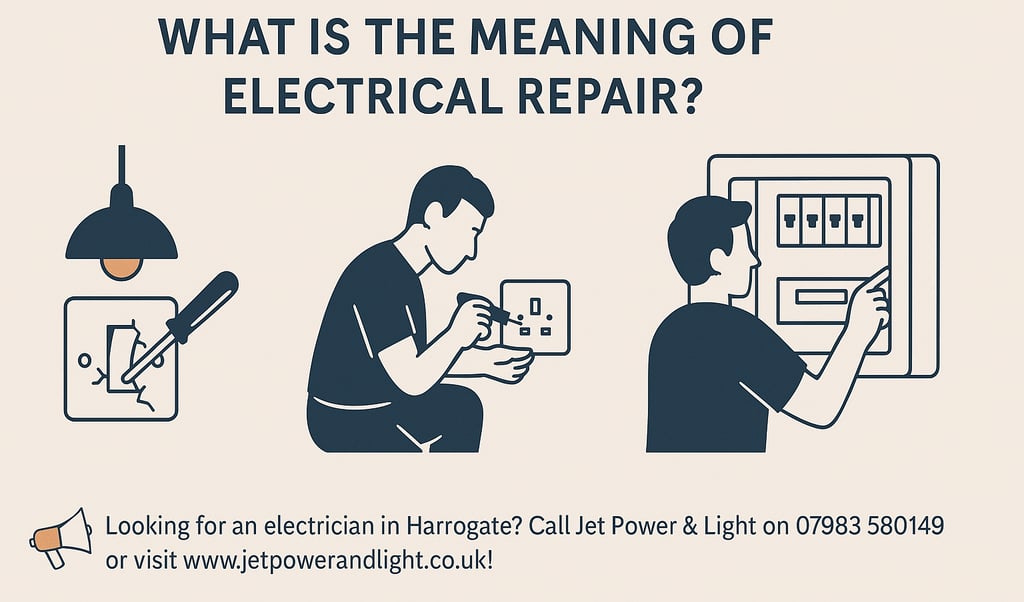What is the Meaning of Electrical Repair?
What is Electrical Repair?
Rita Cani
4/12/20253 min read


⚡ What is the Meaning of Electrical Repair?
Electricity keeps our homes running smoothly — from lighting up our rooms to powering our appliances. But like anything in life, electrical systems and devices can break down. When that happens, electrical repair becomes essential.
But what exactly does electrical repair mean? Is it just about fixing a broken light switch or something bigger?
In this blog post, we’ll break it all down in plain English:
What electrical repair really means
The different types of electrical repairs
Why electrical repair is crucial for your safety
When to DIY and when to call a professional
Let’s plug in and get started! 🔌
🔧 What is Electrical Repair?
Electrical repair means fixing anything that uses or conducts electricity when it stops working properly. This could be a blown fuse, a faulty light fitting, a broken power socket, or even a full rewiring job in a home or business.
In simple terms:
Electrical repairs involve restoring any electrical device or system to working order after it becomes broken, faulty, or unsafe.
This could be due to age, damage, misuse, or just general wear and tear.
This is also known as:
Unscheduled maintenance
Casualty maintenance
Or just… repair work!
Repairs can be small and simple, like replacing a socket or changing a faulty switch. But they can also be large and complex, such as fixing an entire consumer unit or rewiring part of a building after a fault.
🛠️ Common Types of Electrical Repairs
Here are some of the most common types of electrical repair jobs you might come across:
1. ⚡ Fixing Power Outages or Faulty Circuits
Sudden power loss in one part of your home is usually caused by a tripped breaker, a blown fuse, or a wiring fault. Electricians trace the issue and repair the circuit or replace faulty components.
2. 💡 Light Fixture Repairs
Flickering or non-functioning lights are usually a sign of loose wiring, a bad connection, or a broken switch. Replacing light fittings or repairing the wiring is a common task.
3. 🔌 Outlet and Switch Replacements
If your plug sockets or switches feel loose, buzz when used, or have scorch marks — they need to be repaired or replaced to prevent fire risk.
4. 🔥 Overheating or Burning Smells
This is a serious red flag. An electrician will inspect your wiring, sockets, or appliances to locate the source of the heat and fix or replace faulty parts.
5. ⚠️ Circuit Breaker or Fuse Box Repairs
If your fuse board (consumer unit) is outdated or constantly tripping, an electrician may need to replace faulty breakers or upgrade the unit entirely.
6. 🏠 Full or Partial Rewires
For older properties or those with unsafe wiring, electricians may need to rewire entire circuits or parts of the home to modern standards.
7. 🌩️ Surge Damage Repairs
Power surges caused by lightning or faulty appliances can fry electrical systems. Repairs involve replacing damaged wiring or equipment.
🧰 What Causes Electrical Repairs to Be Needed?
Here are some of the most common reasons why electrical systems break down:
Age – Wires degrade, switches wear out, and insulation breaks down over time.
Overuse – Overloading circuits or using too many high-wattage devices on one socket.
Water damage – Moisture is extremely dangerous in electrics and can cause corrosion or shorts.
Rodents or pests – Chewed wires are a common (and dangerous!) issue.
Poor DIY work – Badly installed electrical work often leads to repair calls.
🧠 Why Electrical Repairs Matter
Electrical repairs aren’t just about keeping the lights on — they’re about keeping your home or business safe.
🔥 Prevent Fires
Loose connections, damaged wires, and faulty sockets can easily lead to electrical fires if not fixed.
⚡ Prevent Electric Shocks
Exposed wires or broken outlets can cause serious injury — especially in homes with children or pets.
🏡 Protect Property
Power surges and faulty systems can ruin expensive appliances and cause long-term structural damage.
✅ Ensure Legal Compliance
For landlords and businesses, electrical safety isn’t optional — it’s the law. Regular maintenance and quick repairs keep you compliant and covered.
🔍 Can I Do Electrical Repairs Myself?
The short answer: Only the very basic ones.
Safe DIY Repairs:
Replacing a blown fuse
Changing a lightbulb
Replacing a faceplate on a socket (if you know what you’re doing)
Repairs that require a qualified electrician:
Rewiring
Replacing sockets or light switches
Fixing fuse boards or circuit breakers
Anything involving moisture or high power
Working with electricity is dangerous if you’re not trained. In fact, it’s illegal in the UK to do certain electrical work without the proper certification.
If in doubt — call a professional. It's not worth the risk.
🚨 Signs You Need Electrical Repair
Not sure if something’s wrong? Look out for these warning signs:
⚡ Flickering or dimming lights
🔥 Burning smells near outlets
🔌 Sockets that spark or feel warm
🔋 Frequent tripping breakers
🔊 Buzzing noises in walls or plugs
🌧️ Water leaks near electrical fittings
If you notice any of these, don’t ignore them — they’re your system’s way of telling you something’s wrong.
💡 Final Thoughts
Electrical repair is all about making your home or workplace safer, more efficient, and fully functional again.
It includes everything from minor fixes (like replacing a faulty switch) to major overhauls (like rewiring a whole house). Whatever the size of the job, quick and professional repairs prevent more costly damage down the line — and more importantly, keep you and your family safe.
Jet Power & Light Ltd
Reg.No. 13868909
Jet Power & Light Commercial Ltd
Reg.No. 14733526
VAT Reg.No. 438393761.
Address: 9 Meadow Gate, Harrogate, HG1 3LJ
Registered Office Address: Horley Green House,
Horley Green Road, Halifax, HX3 6AS
COPYRIGHT © 2022 JET POWER & LIGHT LTD - ALL RIGHTS RESERVED.
